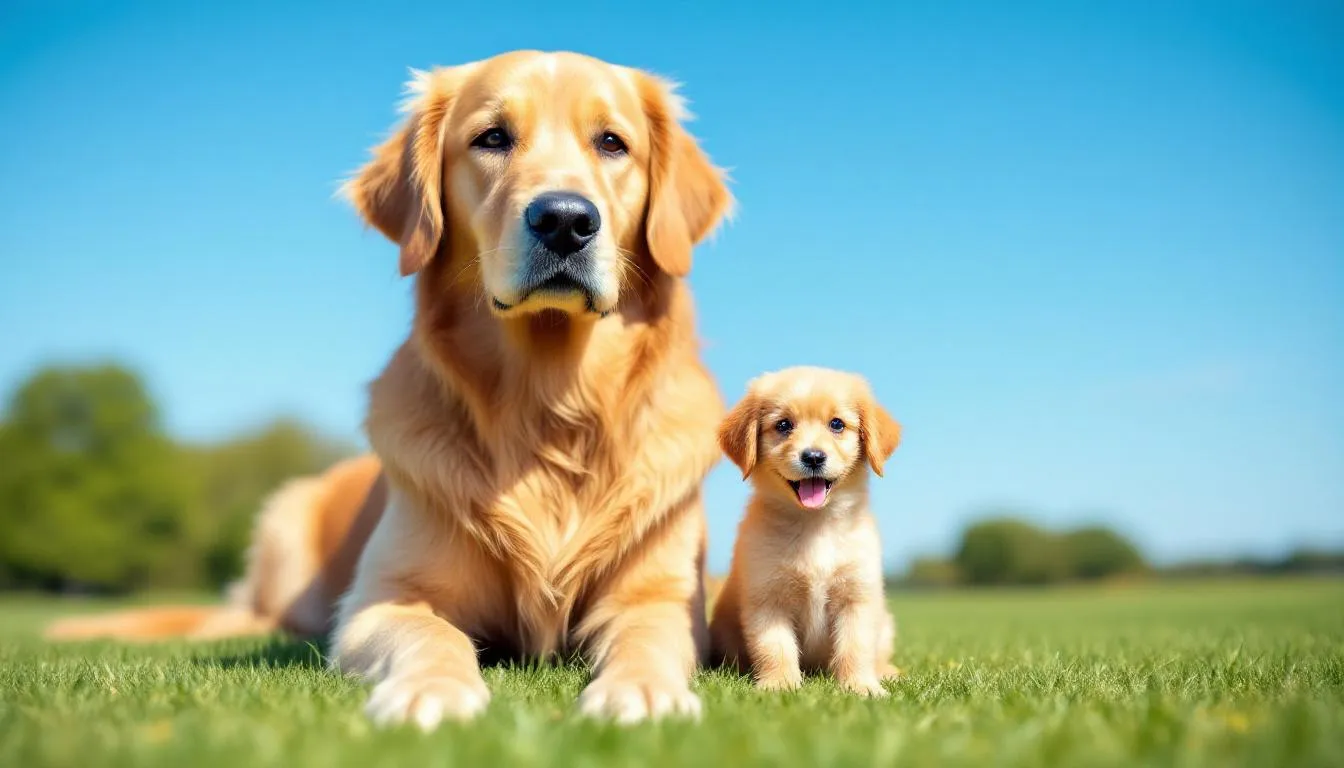

Key Takeaways
Miniature golden retrievers are designer dogs weighing 20-50 pounds, created by crossing golden retrievers with cocker spaniels, cavalier king charles spaniels, or poodles
- Miniature golden retrievers are designer dogs weighing 20-50 pounds, created by crossing golden retrievers with cocker spaniels, cavalier king charles spaniels, or poodles
- These dogs retain the friendly, intelligent temperament of golden retrievers while offering reduced shedding and a more manageable size for families
- They typically live 12-15 years and make excellent therapy dogs, emotional support animals, and family pets due to their gentle nature
- Health testing including OFA certifications and genetic screening for 190+ conditions helps ensure healthier puppies from reputable breeders
- Mini golden retrievers require regular grooming, daily exercise, and proper training to thrive as loyal family companions
These dogs retain the friendly, intelligent temperament of golden retrievers while offering reduced shedding and a more manageable size for families
They typically live 12-15 years and make excellent therapy dogs, emotional support animals, and family pets due to their gentle nature
Health testing including OFA certifications and genetic screening for 190+ conditions helps ensure healthier puppies from reputable breeders
Mini golden retrievers require regular grooming, daily exercise, and proper training to thrive as loyal family companions
Golden retrievers consistently rank among America’s most beloved dog breeds, and for good reason. Their gentle temperament, intelligence, and unwavering loyalty make them ideal family companions. But what if you love everything about golden retrievers except their size? Enter the miniature golden retriever—a thoughtfully bred designer dog that delivers all the best traits of the standard golden retriever in a perfectly manageable package.
Whether you’re living in an apartment, have physical limitations, or simply prefer a smaller companion, mini golden retrievers offer the perfect blend of personality and practicality. These aren’t just shrunk-down versions of their larger cousins—they’re carefully bred dogs that maintain the sweet temperament and intelligence that makes golden retrievers so special, while addressing the space and care challenges that come with larger breeds.
What Are Miniature Golden Retriever Dogs?
The miniature golden retriever represents a purposeful approach to designer dog breeding. Unlike many mixed breeds that happen by accident, these dogs are deliberately created through careful genetic planning as a mix of specific breeds. Breeders typically cross golden retrievers with cocker spaniels, king charles cavalier, cavalier king charles spaniels, or poodles to achieve the desired smaller size while preserving the golden retriever’s renowned personality.
The breeding process isn’t random mixing. A responsible golden retriever breeder aims to maintain at least 50% golden retriever genetics in each puppy, ensuring the core temperament and appearance remain intact. The remaining genetics come from carefully selected parent dogs that contribute specific traits—cocker spaniels for their manageable size and gentle nature, king charles cavalier for their affectionate disposition, and poodles for intelligence and reduced shedding.
You might hear these dogs called by different names, including comfort retrievers, Comfort® Retriever (a trademarked name), petite golden retrievers, or simply mini goldens. The development of this breed traces back to 1989 when the first mini golden retriever, aptly named “Muffin Lacey,” was born. Since then, dedicated breeders have refined the breeding program, with many registering their dogs with the Designer Breed Registry (DBR) to maintain standards and track lineages. Many breeders also participate in dog shows to showcase their mini golden retrievers and demonstrate their commitment to high breeding standards.
The goal isn’t just to create a smaller dog—it’s to preserve what makes golden retrievers special while addressing practical concerns. These dogs represent hybrid vigor, often enjoying better health than their purebred counterparts while maintaining the trainability and loving nature that families seek. The results of responsible breeding often exceed what was expected in terms of temperament and health. Mini golden retriever puppies are known for their suitability for families, and mini golden retriever pups are small, friendly companions that bring joy to their owners.
These dogs have become increasingly popular, not only with families but also among friends and social circles, who often want similar puppies after meeting one.
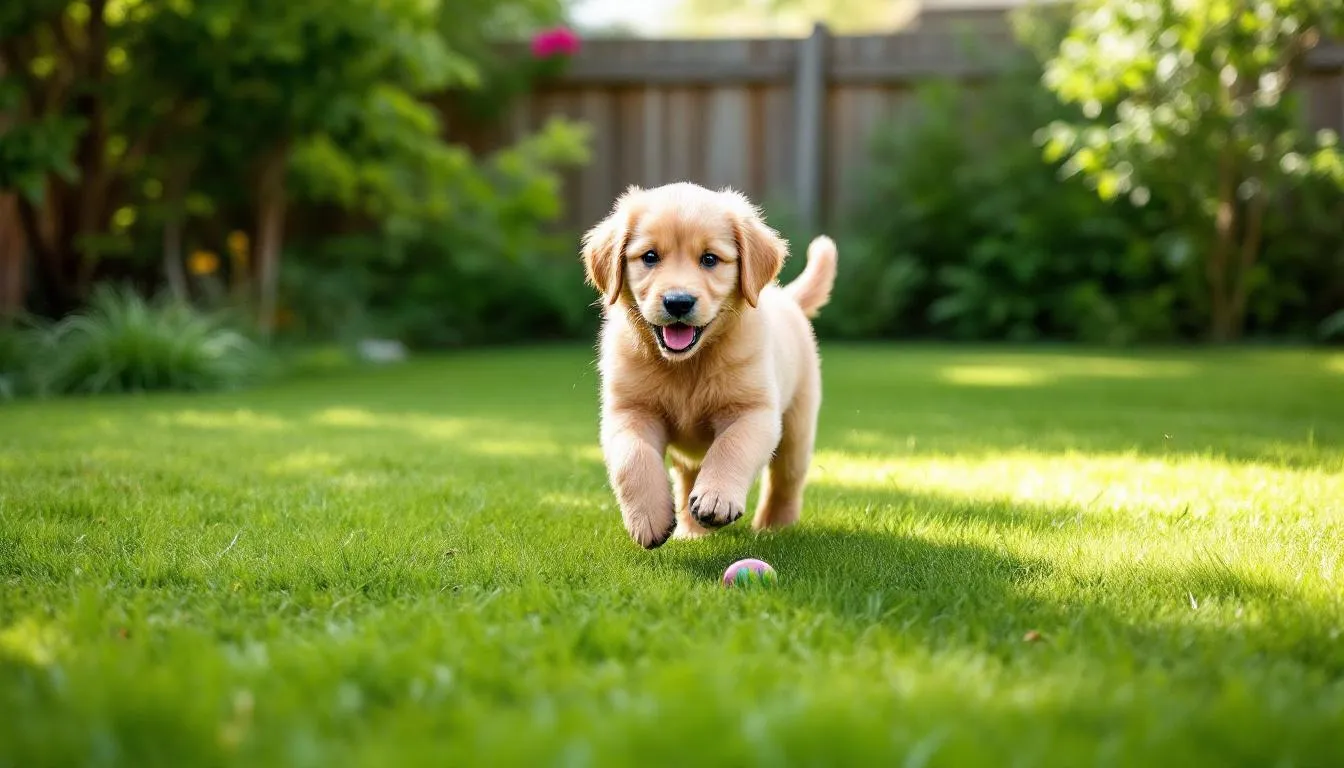

Size and Physical Characteristics
The most obvious difference between miniature golden retrievers and their standard cousins is size, but the variations within mini goldens themselves offer options for different living situations. Most mini golden retrievers weigh between 20-50 pounds and stand 12-18 inches tall at the shoulder—significantly more manageable than standard golden retrievers, which typically weigh 55-75 pounds and reach 21-24 inches in height.
Within the miniature category, you’ll find further distinctions. Toy and micro mini goldens, bred from parent dogs under 25 pounds, typically produce the smallest puppies. Medium mini goldens, from parents over 25 pounds, create slightly larger dogs that still maintain the manageable size advantage. This range allows families to choose the ideal size for their specific needs and living space.
The physical appearance closely mirrors standard golden retrievers, with the same expressive eyes, athletic build, and signature coat colors ranging from light cream to deep gold. Their thick, wavy fur texture maintains the water-resistant qualities of the golden retriever’s double coat, though the exact texture can vary depending on the genetic contribution from other parent breeds.
Shedding patterns depend heavily on the genetic makeup. Mini golden retrievers with more poodle genetics often shed considerably less than those with stronger cocker spaniel or cavalier king charles influence. This variability means each puppy can have different grooming needs, making it important to understand your specific dog’s coat type.
The overall impression should be of a well-proportioned, smaller version of a golden retriever rather than a dog that looks drastically different. Quality breeding programs prioritize maintaining the golden retriever’s classic appearance while achieving the desired size reduction.
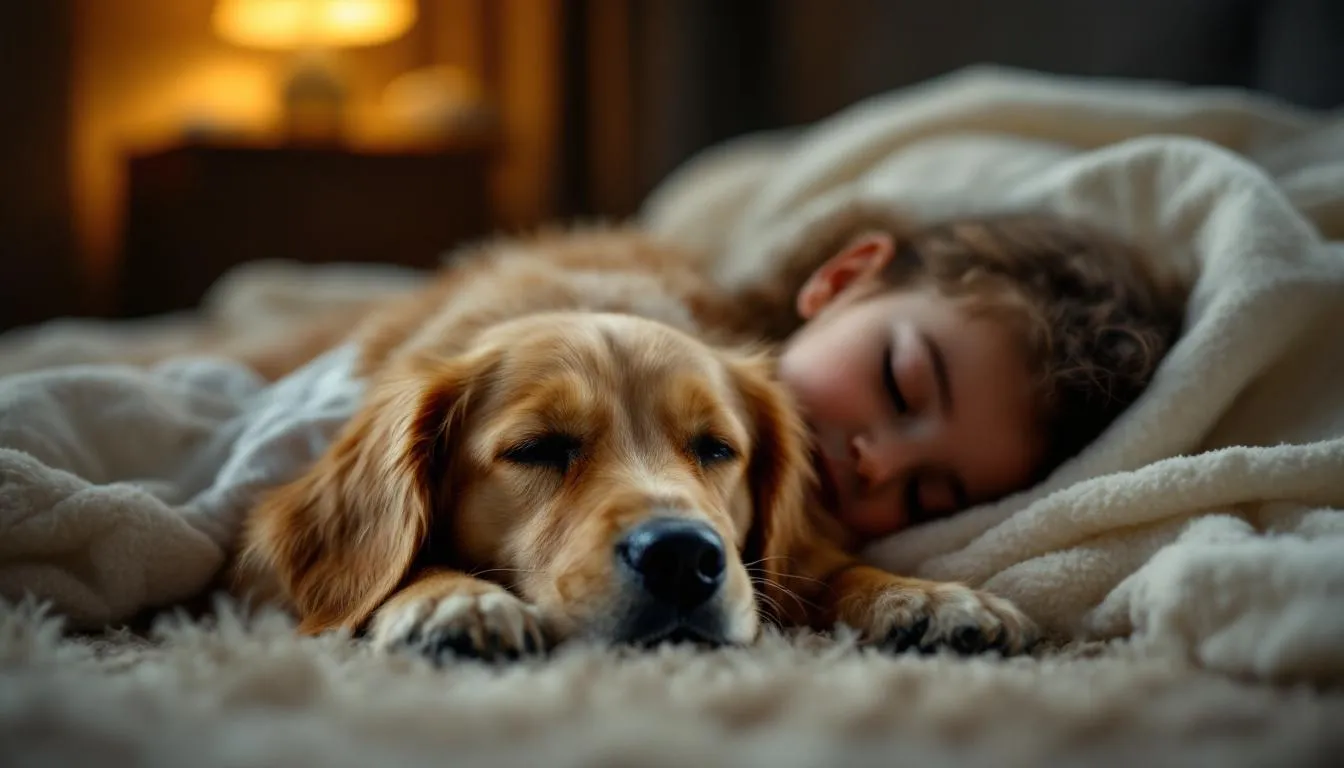

Temperament and Personality Traits
The heart of what makes miniature golden retrievers special lies in their personality—and here, they truly shine as the best dog for families seeking a loving companion. These dogs inherit the golden retriever’s legendary temperament: friendly, gentle, and naturally affectionate. They possess the same eagerness to please that makes golden retrievers so trainable, combined with the intelligence that allows them to excel in various roles from family companion to therapy dog.
Mini golden retrievers typically display calm, confident temperaments that make them excellent with children and other animals. Their patient nature and natural gentleness create safe interactions with toddlers, while their playful side keeps older children engaged. The breed’s inherent social nature means they generally welcome strangers with wagging tails rather than suspicion.
The influence of parent breeds adds subtle variations to the basic golden retriever personality. Cocker spaniel genetics often contribute additional gentleness and a slightly more relaxed energy level. Cavalier king charles spaniel influence tends to enhance the affectionate nature and create dogs that form particularly deep bonds with their families. Poodle genetics can add a touch of independence and problem-solving ability while maintaining the core friendly disposition.
What makes these dogs particularly appealing as family pets is their adaptability. They can be the perfect fit for a variety of households, matching a family’s energy level—content to relax on the couch during quiet evenings but ready for outdoor adventures when the mood strikes. Their loyal and devoted nature creates strong family bonds, while their intelligence makes them responsive to training and household routines.
The combination of traits that make golden retrievers excellent therapy dogs—calmness, empathy, and trainability—remains strong in miniature versions. Many mini golden retrievers excel in emotional support roles, providing comfort through their natural ability to read human emotions and respond appropriately.
Health Considerations and Testing
One of the most significant advantages of miniature golden retrievers is their generally robust health profile. The principle of hybrid vigor means that mixing breeds often results in healthier dogs than their purebred counterparts, as genetic diversity reduces the likelihood of inherited health problems becoming concentrated.
However, mini golden retrievers can still inherit health problems from any of their parent breeds. Common concerns include hip dysplasia, elbow dysplasia, eye diseases, and the tendency toward obesity that affects many golden retrievers. The smaller size actually provides some protection against joint problems, as less body weight means less stress on developing bones and joints.
Reputable breeders invest heavily in health testing to minimize these risks and to produce healthy puppies. Look for breeding dogs with OFA (Orthopedic Foundation for Animals) certifications for hips and elbows, PennHip evaluations for hip dysplasia, and current eye clearances from veterinary ophthalmologists. Advanced genetic testing through services like Embark and Paw Print can screen for over 190 genetic disease combinations, providing unprecedented insight into potential health risks.
|
Health Test |
Purpose |
Frequency |
|---|---|---|
|
OFA Hip/Elbow |
Screen for dysplasia |
Before breeding |
|
Eye Clearance |
Detect hereditary eye diseases |
Annually |
|
Genetic Panel |
Screen 190+ conditions |
Once per breeding dog |
|
Heart Clearance |
Detect cardiac issues |
Before breeding |
Health Test
Purpose
Frequency
OFA Hip/Elbow
Screen for dysplasia
Before breeding
Eye Clearance
Detect hereditary eye diseases
Annually
Genetic Panel
Screen 190+ conditions
Once per breeding dog
Heart Clearance
Detect cardiac issues
Before breeding
The lifespan of mini golden retrievers typically ranges from 12-15 years, often exceeding that of standard golden retrievers. This longevity advantage comes from both the hybrid vigor effect and the reduced stress on organs and joints from carrying less body weight throughout their lives.
Proper nutrition is also crucial for mini golden retrievers. High-quality food supports not only growth and development but also strengthens the puppy's immune system, helping to prevent disease and promote vitality.
Regular veterinary care remains essential regardless of the breed’s general health advantages. Annual wellness exams, appropriate vaccinations, parasite prevention, and dental care form the foundation of long-term health and help maintain the dog's overall health. The breed’s food-motivated nature requires careful attention to weight management, as obesity can negate many of the health benefits of their smaller size.
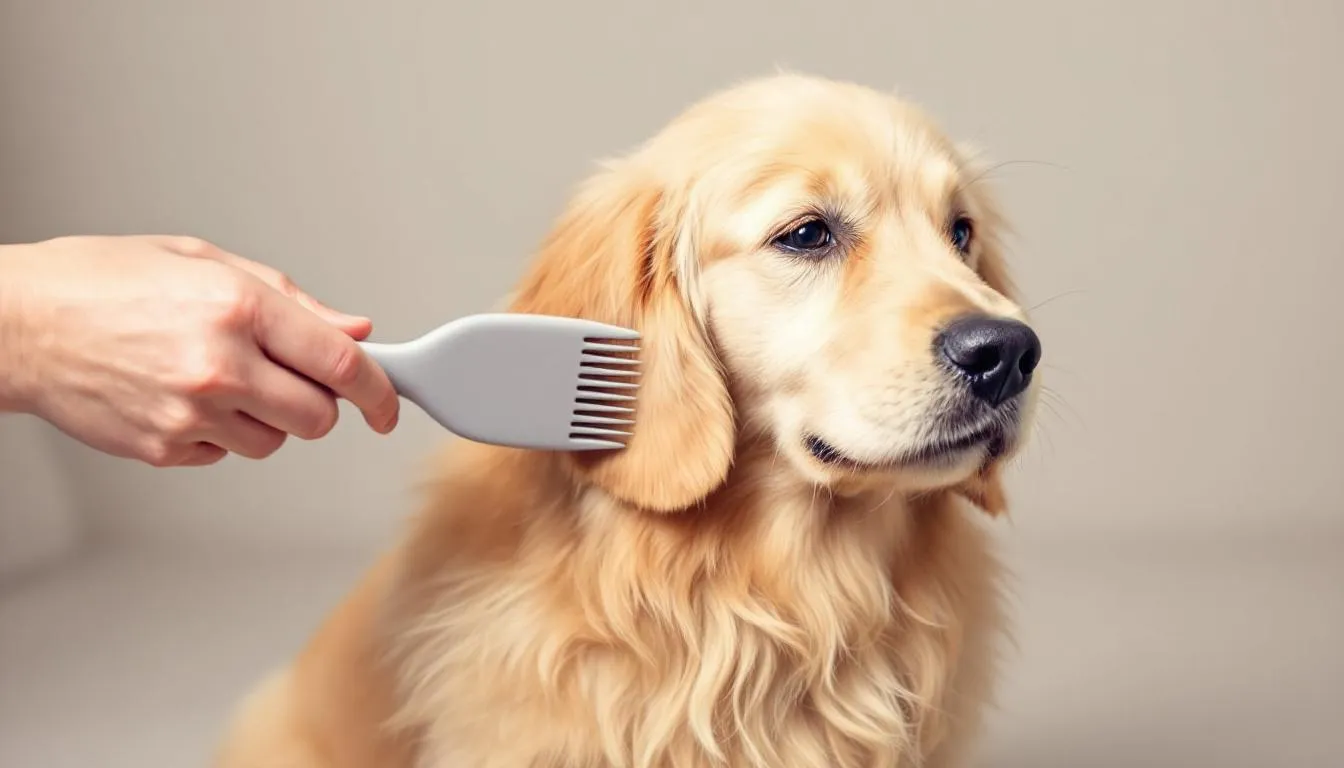

Care and Grooming Requirements
Maintaining a miniature golden retriever’s coat requires regular attention, but the effort pays dividends in both appearance and health. Their thick, often wavy fur needs brushing two to three times weekly to prevent matting and distribute natural oils that keep the coat healthy and shiny. Work systematically through sections, paying special attention to areas prone to tangling like behind the ears, under the legs, and around the collar line.
Professional grooming every 6-8 weeks helps maintain optimal coat condition and hygiene. A skilled groomer can trim excess hair, clean ears thoroughly, and handle nail maintenance that many owners find challenging. The frequency might vary based on your dog’s specific coat type—those with more poodle genetics may need more frequent professional attention, while those closer to the golden retriever side might require less intensive grooming.
Daily exercise needs remain important despite the smaller size. Most mini golden retrievers thrive with 45-60 minutes of activity daily, broken into manageable segments. Two brisk walks, some yard time, and indoor play sessions usually satisfy their physical needs while providing mental stimulation. The breed’s intelligence means they need brain work as well as physical exercise—puzzle toys, training sessions, and new experiences prevent boredom-related behaviors.
Proper nutrition becomes especially important for maintaining the ideal weight. These dogs inherit the golden retriever’s food motivation, making them prone to overeating if portions aren’t carefully measured. High quality food appropriate for their life stage, combined with regular body condition assessments, helps prevent obesity that can compromise joint health and overall well-being.
Climate considerations matter more for mini golden retrievers than their larger cousins. Their smaller body mass means they may need extra warmth in cold weather and additional cooling support in extreme heat. Many owners find their mini goldens prefer climate-controlled indoor environments, making them ideal for apartment living or homes where temperature control is important.
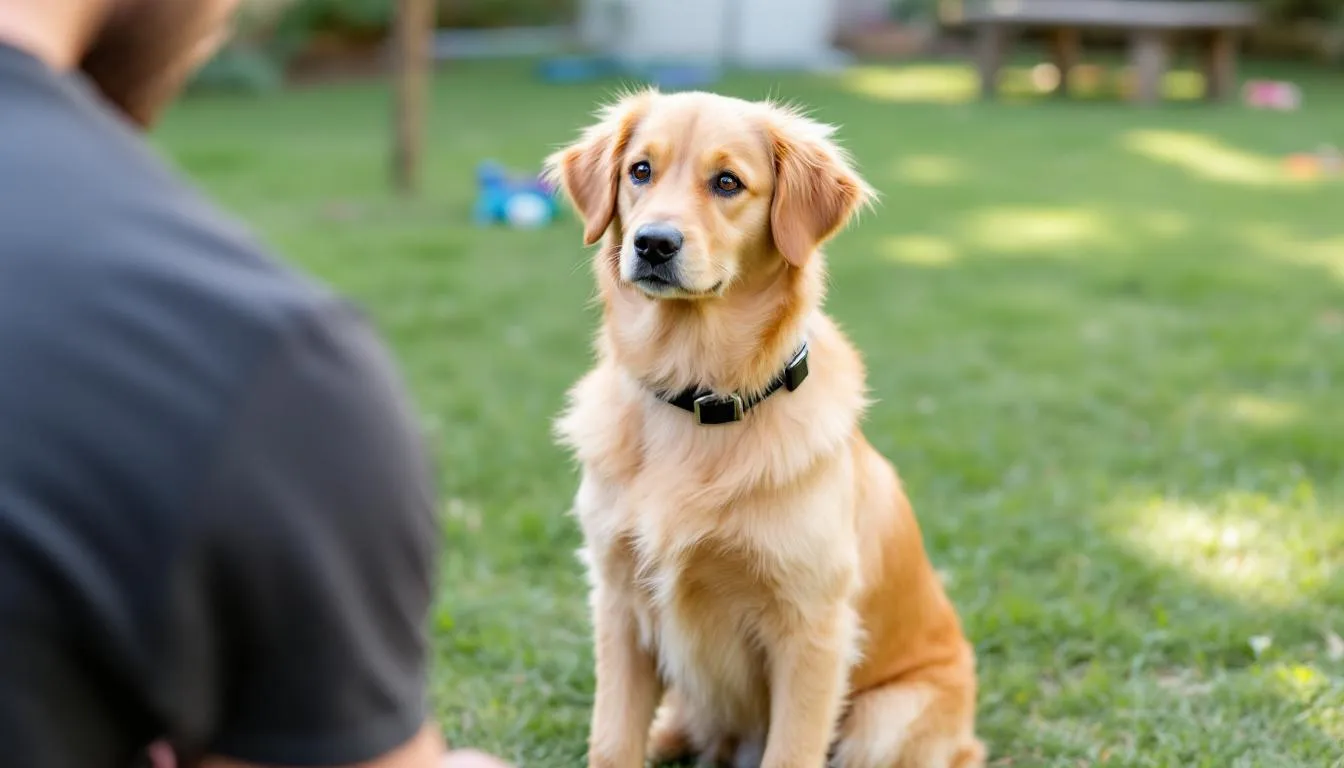

Training and Socialization
The intelligence and eagerness to please that define golden retrievers make miniature golden retrievers exceptionally trainable. Start with basic obedience training focusing on essential commands like sit, stay, come, and down. These foundation skills create the structure needed for a well-behaved family dog while building the communication system between you and your pup.
Early socialization proves crucial for developing a well-adjusted adult dog. Expose your mini golden retriever puppy to various people, animals, environments, and experiences during their critical socialization period. The breed’s naturally friendly disposition makes this process generally smooth, but controlled exposure helps build confidence and prevents potential anxiety issues later in life.
The breed’s calm temperament and high intelligence make them excellent candidates for advanced training, including therapy dog certification. Many mini golden retrievers excel in emotional support roles, leveraging their natural empathy and trainability to provide comfort in hospitals, nursing homes, and educational settings.
Training sessions work best when kept short and positive. Use treats, praise, and play as rewards, focusing on building a strong bond through clear communication. The breed responds particularly well to consistency—establish routines for training, feeding, and exercise that help your dog understand expectations.
Preparation for grooming and veterinary visits should be part of early training. Handle paws, ears, and mouth regularly so professional care becomes stress-free. Practice walking on leash in various environments, including around distractions, to ensure your mini golden retriever can safely accompany you in different situations.
The key to successful training lies in understanding that these dogs want to please their families. Channel that motivation into positive learning experiences that strengthen your relationship while creating the well-mannered companion you’re seeking.
Comfort and Companionship: The Emotional Value of Mini Golden Retrievers
Mini golden retrievers are cherished not only for their adorable looks and manageable size, but also for the deep comfort and companionship they bring to their families. With their sweet temperament and affectionate nature, these dogs have an extraordinary ability to form strong emotional bonds with their owners, making them a source of unwavering support and joy in daily life.
As a mixed breed, the mini golden retriever combines the best traits of the golden retriever, cocker spaniel, and sometimes poodle, resulting in a dog that is friendly, intelligent, and loyal. This perfect blend of breeds gives mini golden retrievers a gentle and loving personality, making them ideal therapy dogs and beloved companions for people of all ages. Their small size and hypoallergenic qualities, inherited from the poodle, also make them a great fit for families with limited space or mild allergies.
The emotional value of a mini golden retriever goes beyond simple companionship. These dogs are known for their ability to sense their owners’ moods and provide comfort during stressful times. Their presence can help reduce anxiety, improve mental well-being, and foster a sense of security and belonging. Whether snuggling on the couch after a long day or offering a wagging tail to greet you at the door, mini golden retrievers excel at making their owners feel loved and supported.
Families with children especially appreciate the gentle and patient nature of mini golden retrievers. These dogs are energetic enough to join in playtime, yet calm and tolerant, making them a safe and reliable friend for kids. Their affectionate personality and manageable size also mean they can easily adapt to a variety of living situations, from apartments to larger homes.
When searching for a mini golden retriever puppy, it’s important to choose a breeder who prioritizes health testing, genetic diversity, and the well-being of their breeding dogs. This ensures that you bring home a healthy puppy with the sweet temperament and loving personality that defines the breed. Proper nutrition, regular exercise, and attentive care will help your mini golden retriever thrive, allowing them to share many joyful years with your family.
In every way, the mini golden retriever is a perfect companion—offering comfort, companionship, and a deep sense of connection. Their unique combination of intelligence, loyalty, and affectionate nature makes them one of the best choices for anyone seeking a loving friend and a joyful addition to their lives.
Choosing a Reputable Breeder
Selecting the right breeder makes the difference between bringing home a healthy, well-adjusted puppy and facing years of potential problems. Ethical breeders invest heavily in health testing, temperament evaluation, and proper care—practices that should be evident when you research potential sources for your mini golden retriever puppy. Some reputable breeders also use a puppy nanny service to ensure your puppy is safely, comfortably, and lovingly delivered to you, with a professional accompanying and caring for the puppy throughout the journey.
Look for breeders who provide comprehensive health clearances for all breeding dogs. This includes OFA certifications for hips and elbows, current eye clearances, and genetic testing for the extensive panel of hereditary conditions. Reputable breeders willingly share these results and explain what they mean for your potential puppy’s health prospects.
Ask detailed questions about the breeding program. How long has the breeder been working with mini golden retrievers? What are their goals for the breed? How do they select parent dogs? Quality breeders can articulate their breeding philosophy and explain why specific pairings were chosen. They should also be asking you questions about your lifestyle, experience with dogs, and expectations.
Red flags include breeders who always have puppies available, won’t let you meet the parent dogs, can’t provide health clearances, or seem more interested in payment than ensuring a good match. Puppy mills and backyard breeders often cut corners on health testing and socialization, creating long-term problems for both dogs and families.
|
Breeder Quality Indicators |
Red Flags |
|---|---|
|
Health testing documentation |
Always has puppies available |
|
Meet parent dogs |
Won’t show breeding facilities |
|
Lifetime support offered |
No health clearances |
|
References from other owners |
Pressure for quick decisions |
|
Professional facilities |
Multiple breeds/high volume |
Breeder Quality Indicators
Red Flags
Health testing documentation
Always has puppies available
Meet parent dogs
Won’t show breeding facilities
Lifetime support offered
No health clearances
References from other owners
Pressure for quick decisions
Professional facilities
Multiple breeds/high volume
The finest mini golden retrievers come from breeders who offer lifetime support and health guarantees. They want to hear from you throughout your dog’s life and will take back any dog they’ve bred if circumstances change. This commitment demonstrates confidence in their breeding program and genuine care for the dogs they produce.
Professional nursery environments with proper climate control, sanitation, and enrichment indicate serious breeding operations. Puppies should be raised in clean, stimulating environments that prepare them for life as family pets rather than isolated in kennels.
Mini Golden Retrievers as Therapy and Service Dogs
The natural aptitude of miniature golden retrievers for therapy and emotional support work stems from the same qualities that make them exceptional family pets. Their calm temperament, high intelligence, and innate ability to read human emotions create ideal candidates for various assistance roles.
Many mini golden retrievers excel as therapy dogs, providing comfort in hospitals, schools, and care facilities. Their manageable size makes them perfect for visiting patients in bed or working with children who might find larger dogs intimidating. The breed’s gentle nature and natural empathy allow them to provide emotional support while remaining calm in potentially stressful environments.
The path to therapy dog certification requires specific training and evaluation, but mini golden retrievers often adapt quickly to the requirements. They must demonstrate reliability around medical equipment, wheelchairs, and various healthcare environments while maintaining their friendly disposition. Their intelligence makes learning these specialized skills relatively straightforward.
Emotional support roles don’t require the same formal certification as therapy dogs, but mini golden retrievers naturally excel in providing comfort to their handlers. Their deep bonding capabilities and intuitive understanding of human emotions make them particularly effective for individuals dealing with anxiety, depression, or other mental health challenges.
The smaller size advantage becomes particularly apparent in therapy work. These dogs can accompany handlers in more situations than larger dogs, from airplane travel to small office spaces. Their presence provides comfort without the space requirements or intimidation factor that might limit larger therapy dogs.
Success stories abound of mini golden retrievers making meaningful differences in people’s lives through their work as comfort dogs. Their combination of golden retriever empathy and manageable size creates unique opportunities to serve others while strengthening the bond with their primary handlers.
Living with a Miniature Golden Retriever
Daily life with a miniature golden retriever revolves around the same rhythm that makes golden retrievers such beloved family pets, just scaled to fit smaller homes and different lifestyles. Their manageable size makes them ideal for apartment living, provided their exercise and mental stimulation needs are met consistently.
Morning routines typically include a brisk walk or yard time, feeding with measured portions to prevent overeating, and some interactive play or training. The breed’s intelligence means they thrive on routine and predictability—knowing what to expect helps them settle into family life seamlessly.
Exercise requirements remain important but become more flexible with the smaller size. A combination of physical activity and mental stimulation works better than long marathons. Indoor games on rainy days, puzzle toys during quiet times, and socialization opportunities with other dogs create a well-rounded activity schedule.
The breed’s compatibility with families extends to households with multiple pets. Their gentle nature and natural sociability usually result in peaceful coexistence with cats, other dogs, and even smaller pets when properly introduced. Children particularly benefit from the mini golden retriever’s patient temperament and playful spirit.
Travel considerations become much simpler with a smaller dog. Many mini golden retrievers can fly in cabin rather than cargo, and their adaptable nature makes them excellent travel companions. Their size allows them to stay in more hotels and vacation rentals, expanding options for family trips.
Long-term commitment considerations include the 12-15 year lifespan and the ongoing costs of quality nutrition, regular grooming, and veterinary care. However, many owners find the breed’s manageable size and excellent health record make these investments more sustainable than those required for larger breeds.
The deep love and joy these dogs bring to families often far exceeds the practical considerations. Their ability to adapt to changing family circumstances—from young couples to growing families to empty nesters—makes them lifelong companions rather than dogs suited only to specific life stages.
FAQ
Are mini golden retrievers good for first-time dog owners?
Yes, their intelligent and eager-to-please nature makes them excellent for beginners, though they do require consistent training and regular grooming. Their smaller size makes handling easier for inexperienced owners, while their forgiving temperament allows for learning opportunities during the training process.
How much do mini golden retrievers typically cost?
Prices vary by breeder but expect to pay premium prices for health-tested puppies from reputable breeders, typically ranging from $1,500 to $4,000. Ongoing costs include grooming every 6-8 weeks, quality nutrition, and regular veterinary care, but these expenses are often lower than those for larger breeds due to reduced food consumption and medication dosages.
Do mini golden retrievers shed less than regular golden retrievers?
Yes, depending on their genetic makeup, many mini goldens shed significantly less, especially those with poodle genetics. However, some may still have moderate shedding similar to their golden retriever parentage. The specific coat type varies with each individual dog’s genetic combination.
Can mini golden retrievers be left alone during work hours?
While they can adapt to being alone for reasonable periods with proper training, they thrive on companionship and may develop separation anxiety if left alone for extended periods without gradual conditioning. Most owners find success with 6-8 hour absences when dogs have adequate exercise before and after work.
What’s the difference between F1, F1B, and multi-generational mini golden retrievers?
F1 are first-generation crosses between a golden retriever and another breed (cocker spaniel, poodle, or cavalier king charles spaniel). F1B are backcrosses where an F1 mini golden is bred back to one of the original parent breeds, often resulting in more predictable traits. Multi-generational involves breeding mini goldens together, which can produce more consistent characteristics but requires careful selection to maintain the desired golden retriever traits and manageable size.
FAQ
Are mini golden retrievers good for first-time dog owners?
Yes, their intelligent and eager-to-please nature makes them excellent for beginners, though they do require consistent training and regular grooming. Their smaller size makes handling easier for inexperienced owners, while their forgiving temperament allows for learning opportunities during the training process.
How much do mini golden retrievers typically cost?
Prices vary by breeder but expect to pay premium prices for health-tested puppies from reputable breeders, typically ranging from $1,500 to $4,000. Ongoing costs include grooming every 6-8 weeks, quality nutrition, and regular veterinary care, but these expenses are often lower than those for larger breeds due to reduced food consumption and medication dosages.
Do mini golden retrievers shed less than regular golden retrievers?
Yes, depending on their genetic makeup, many mini goldens shed significantly less, especially those with poodle genetics. However, some may still have moderate shedding similar to their golden retriever parentage. The specific coat type varies with each individual dog’s genetic combination.
Can mini golden retrievers be left alone during work hours?
While they can adapt to being alone for reasonable periods with proper training, they thrive on companionship and may develop separation anxiety if left alone for extended periods without gradual conditioning. Most owners find success with 6-8 hour absences when dogs have adequate exercise before and after work.
What’s the difference between F1, F1B, and multi-generational mini golden retrievers?
F1 are first-generation crosses between a golden retriever and another breed (cocker spaniel, poodle, or cavalier king charles spaniel). F1B are backcrosses where an F1 mini golden is bred back to one of the original parent breeds, often resulting in more predictable traits. Multi-generational involves breeding mini goldens together, which can produce more consistent characteristics but requires careful selection to maintain the desired golden retriever traits and manageable size.






